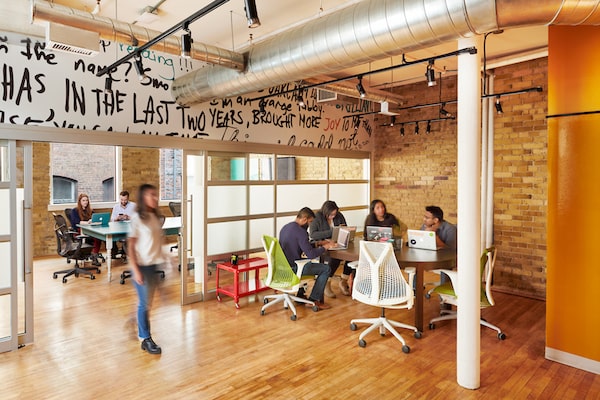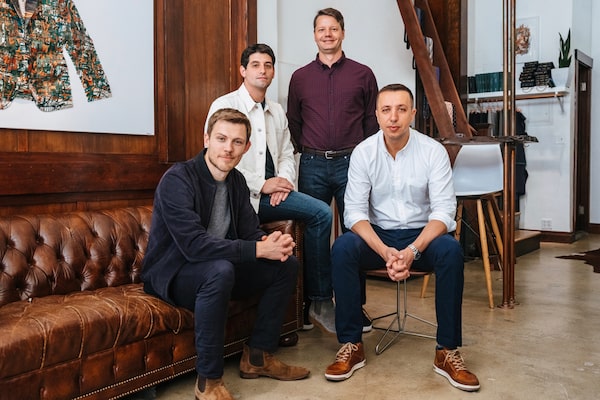
South Korean tech company Naver acquired Toronto social platform Wattpad in 2021—and it plans to stay in Canada long-term.Supplied
It’s been called “the Olympics of tech” by Politico. And, when you hear the stats—35,000 attendees, 600+ speakers—you can start to understand why the return of Collision, a massive tech conference, to Toronto this June is, well, a big deal.
It’s easy to see why Toronto is the place conference organizers chose for this event, which draws big industry names like the co-founders of Cloudflare, Blockchain and Substack. Ontario is North America’s fastest growing tech jobs market and the second-largest IT cluster on the continent (after California). The biggest names in tech—Amazon, Uber, Microsoft—all have operations here. Waterloo, Toronto and Ottawa are also ranked as some of the world’s best start-up ecosystems.
And while Shopify tends to be the most obvious name people think of when they talk about Canadian tech, Ontario is home to many other success stories in the industry. One thing some of them have in common? They’ve benefitted from foreign direct investment (FDI), which happens when a global company sets up shop in Canada, expands its operations here, or even merges with a Canadian business.
This has enabled them to combine their Canadian springboard with international resources to accelerate their success. Here are three such companies doing exactly that.
How homegrown talent helps Faire disrupt the wholesale game
With Faire, co-founder and CTO Marcelo Cortes and his team have “proved that you can build a very large company outside of Silicon Valley,” he says from his office in Waterloo, Ont.
Cortes isn’t being hyperbolic—Faire, an online wholesale platform that connects over 500,000 retailers with 70,000 brands, many of them small businesses, has been valued at $12.4-billion USD, qualifying it for the coveted “unicorn status,” which is awarded to start-ups that are worth over $1-billion.
And while they’re also a Silicon Valley success story (Faire’s other HQ office is in San Francisco) the business is firmly rooted in Ontario’s Waterloo Region. Before Cortes co-founded Faire in 2017, he helped Square, the San Francisco-based payment system, open its first engineering office in Kitchener-Waterloo. When it came time to start Faire, Cortes didn’t see why they couldn’t operate under that same successful model, with Cortes heading up engineering in Ontario and his co-founders, also Square alum, working out of California.
Cortes says a big part of Faire’s success so far comes down to local talent: “I really like what we have here,” he says. “We have access to all the talent [in this region].”
The proximity of the prestigious University of Waterloo has also been a huge plus, including its robust co-op program that will place 45 students at Faire next term alone. They’ve also created roughly 300 jobs in Waterloo Region thanks in part to investment from Bay Area stalwarts like Sequoia Capital and Khosla Ventures. And, Cortes says, Faire has benefitted from knowledge transfer as it is an infusion of cash. “I got to learn first-hand what went wrong, or what was a great thing to do early that worked?” says Cortes of the connections his investors helped him make to companies like AirBnB and Instagram. This helped him avoid costly mistakes, which would have jeopardized Faire’s ability to grow, hire local talent and become more innovative.

The founders of Faire, a Waterloo, Ont. start-up that's changing the way the wholesale business works.Supplied
And that’s not the only way it is making an impact on the community. Faire’s model totally disrupts the traditional wholesale process, giving small and medium-sized local businesses access to data that has traditionally only been available to the biggest retailers, which helps them grow their businesses, too.
Here’s how it works: Let’s say you own a gift shop, and you’re looking for new merchandise. Before Faire, you’d probably go to a trade show hoping to find that ‘next big thing’ that will fly off your shelves. If you see something that your customers might like, you make an order, paying up-front. But you run the risk that customers won’t like that product and it’ll sit on your shelves, even with steep markdowns. Not so with Faire.
“We’re empowering stores with tools that have only been available to very large retailers in the past, and we’re using this data to make local shops more competitive,” says Cortes.
Whether it’s directly employing residents of Waterloo Region, or providing local businesses with the tools they need to succeed, it’s clear FDI is helping Faire make the area a better place to work.
South Korean tech company Naver invests in Toronto and its people
If there’s one word that best describes Naver’s acquisition of Wattpad, it’s “synergy.”
“We just think that combined, we’ll be able to do so much more,” says Namsun Kim, chief financial officer of Naver, a company that has been described as “the Google of South Korea.”
Specifically, Kim is referring to the synergies that exist between Wattpad, a Canadian social platform that allows writers to upload their own fiction and connect directly to readers, and Naver’s Webtoon. The latter does much the same thing with comics, many of which are inspired by books themselves, and vice versa.
“We thought that the two platforms would mesh together really, really well because you have this virtuous cycle of novels to Webtoons, Webtoons to novels. It’s all literature, but one is graphic and the other isn’t,” says Kim, who notes that when Naver first launched its search engine service, Naver needed to create Korean-language content for people to search. It has since become a groundbreaking way for artists to bypass the usual gatekeepers and get their work out into the world.
Wattpad, which has 90 million monthly users, and over 665 million story uploads, was founded in 2006 in Toronto by Allen Lau and Ivan Yuen. Naver’s executives had admired the company for years, and eventually approached Lau and Yuen last year to see if they’d be interested in being acquired. A year—and one $600-million deal later—the integration of Wattpad into Naver has been “fantastic,” says Kim, especially when it comes to collaborating on film projects. There are over 100 projects in that development pipeline alone.
“Wattpad was farther along in IP development than we were,” says Kim, nodding to the success of the After series, which had begun on Wattpad and were turned into feature films. “The team just had much more experience than we did, so today we’ve combined the two studios under one leadership, spanning the scene from Toronto all the way to Hollywood where Webtoons is based.”
Wattpad’s location was also an attractive part of the equation. “The diversity, the growth, the fact that it’s a young city attracting talent from all over the world” were all points in its favour, Kim says. “And then we realized that Toronto is one of the most advanced AI environments. This couldn’t have been a better choice.” (AI is a key research area for the company.)
In the year since the acquisition, Wattpad’s team has grown from 180 people to 250. And Naver is here for the long-term, stresses Kim.
“We’re here to stay. We’re not one of those investors that make an investment to flip it,” he says. “Once we’re part of something, we’re permanent.”
Why HCL Technologies sees Canada as a strategic growth region
There’s nothing modest about the scale at which HCL Technologies operates. This India-based information technology services and consulting firm operates in 52 countries, caters to industries as diverse as financial services, telecommunications and media and manufacturing and more; and in the last fiscal year reported a consolidated revenue of $11.48-billion. It has nearly 209,000 employees, or “ideapreneurs” as they’re called internally, a title that is tied to the company’s core value of believing every employee could come up with their next big innovation, making the people who work for this global company its most important asset.
Many of those “ideapreneurs” can be found right here in Canada. The company employs more than 2,000 people in Canada, with plans to grow by an additional 1,000 in the next three years. HCL Technologies opened its first Toronto office in 2009, and it has since expanded to create innovation and R&D centers in Moncton, Vancouver and Victoria.
“We see enormous opportunity in Canada for HCL Technologies, both in terms of our overall business growth and as a key location for creating robust onshore and nearshore delivery capabilities,” says Joelien Jose, executive vice president and country head - Canada, HCL Technologies, referring to a model of service delivery where a vendor sends their team directly into the client’s offices to help develop and implement new technologies.
It’s an approach that HCL has already seen work successfully with the over 70 Canadian companies they’ve helped on “digital transformation journeys” as Jose puts it.
And HCL anticipates even more opportunity in this market. “We are extremely bullish about our prospects in the region,” says Jose, nodding to a recent IDC stat that forecasts Canadian IT spending will reach $132.6-billion by 2025, making it one of the fastest growing IT markets globally.
As a leader in next-generation technology, HCL Technologies is laying the foundation to seize this opportunity and expand its presence in Canada. To fuel this growth, HCL Technologies is relying on and purposefully fostering Canada’s home grown talent, which was also part of what made the country such an attractive place to invest.
A key pillar of this commitment is HCL Technologies’ paid IT-specific apprenticeships, which allow new high school grads to build the skills they’ll need for tomorrow’s world today. The program, part of the company’s Rise at HCL Technologies early career and training program, gives high school graduates who do not have a formal college degree the ability to pursue a career in a fast-growing industry, with focus areas in software development and testing, digital and cloud services, and infrastructure delivery and engineering.
“Canada has one of the largest talent pools in the world. Combined with the country’s existing, cutting-edge innovation ecosystem, there’s a tremendous opportunity in Canada for us to tap into,” says Jose. “HCL Technologies is committed to supporting the next generation of technologists through our extensive training and recruitment programs.”
It’s clear that the Canadian tech sector is a major driver of foreign investment; from 2017 to 2021, 594 global companies invested in information technologies here, at home. And when global companies choose to expand here, it doesn’t just benefit our economy today. It also strengthens the economy of tomorrow by creating jobs, fostering innovation and leading us toward a more sustainable future.
Advertising feature produced by Globe Content Studio with Invest in Canada. The Globe’s editorial department was not involved.